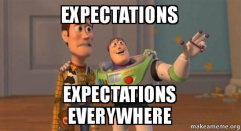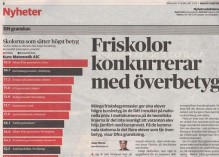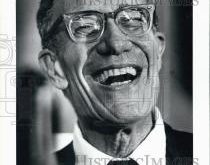Model validation and significance testing In its standard form, a significance test is not the kind of ‘severe test’ that we are looking for in our search for being able to confirm or disconfirm empirical scientific hypotheses. This is problematic for many reasons, one being that there is a strong tendency to accept the null hypothesis since they can’t be rejected at the standard 5% significance level. In their standard form, significance tests bias against...
Read More »Det finanspolitiska ramverket — ett allvarligt feltänk
Det finanspolitiska ramverket — ett allvarligt feltänk Den ekonomiska krisen i kölvattnet på coronapandemin är inte en vanlig konjunkturnedgång utan en exceptionell situation. Väldiga summor satsas nu för att hålla företag och löntagare under armarna och ge nödhjälp till sjukvården. I coronakrisen spår har majoriteten av drabbade länder i världen ökat sin skuldkvot betydligt. Även i Sverige har skuldkvoten ökat. Denna typ av unika händelse blir därför en...
Read More »Den svenska skolans extrema olikvärdighet
Den svenska skolans extrema olikvärdighet En intressant fråga är hur stor del av elevernas resultat som skolan egentligen kan förklara. En lämplig utgångspunkt för att ta sig an denna fråga är bilaga 7 i senaste Långtidsutredningen (LU) … I likhet med en likaledes gedigen rapport från Skolverket landar LU i att vilken skola eleverna går på kan förklara mellan 2 och 5 procent av den totala spridningen i elevernas kunskapsresultat. LU sammanfattar med att...
Read More »Expected utility theory — nothing but an ex-hypothesis
Expected utility theory — nothing but an ex-hypothesis In mainstream theory, preferences are standardly expressed in the form of a utility function. But although the expected utility theory has been known for a long time to be both theoretically and descriptively inadequate, mainstream economists gladly continue to use it, as though its deficiencies were unknown or unheard of. What most of them try to do in face of the obvious theoretical and behavioral...
Read More »Friskolefusket — nu får det vara nog!
Friskolefusket — nu får det vara nog! Swedish school system has somewhat oddly combined market principles such as decentralization, choice, competition, and corporate providers with an evaluation system that is highly trust-based and where teacher-set school grades are high-stakes for the students. This means that both students and schools have incentives to game a system that is easy to game and the findings suggest that the integrity of the evaluation...
Read More »Back in the USSR
Back in the USSR .[embedded content]
Read More »But once, we were here …
But once, we were here … .[embedded content]In loving memory of my brother, Peter ‘Uncas’ Pålsson.
Read More »Kyiv calling
.[embedded content]
Read More »The irrelevance of the Ramsey growth model
The irrelevance of the Ramsey growth model So in what sense is this “dynamic stochastic general equilibrium” model firmly grounded in the principles of economic theory? I do not want to be misunderstood. Friends have reminded me that much of the effort of “modern macro” goes into the incorporation of important deviations from the Panglossian assumptions that underlie the simplistic application of the Ramsey model to positive macroeconomics. Research focuses...
Read More »Indicting Putin for war crimes
Indicting Putin for war crimes .[embedded content]
Read More » Lars P. Syll
Lars P. Syll






